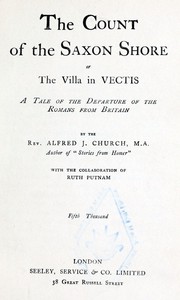The Count of the Saxon Shore; or The Villa in Vectis.<br />A Tale of the Departure of the Romans fro by Church and Putnam (the ebook reader txt) 📕

Read free book «The Count of the Saxon Shore; or The Villa in Vectis.<br />A Tale of the Departure of the Romans fro by Church and Putnam (the ebook reader txt) 📕» - read online or download for free at americanlibrarybooks.com
- Author: Church and Putnam
Read book online «The Count of the Saxon Shore; or The Villa in Vectis.<br />A Tale of the Departure of the Romans fro by Church and Putnam (the ebook reader txt) 📕». Author - Church and Putnam
A council was held at which Constantine, his two sons, and three of the officers of highest rank were present, and the urgent question of the day was anxiously debated.
Julian began the discussion.
“The army,” he said, “must be employed, or it will find mischief to do at home which all of us will be sorry for.”
“I have some one to introduce to your Majesty,” said one of the officers present, “who may have something to say which will influence your decision. He is from Ierne,25 and brings me a letter from the commander at Uriconium. He came last night.”
“Let him enter,” said Constantine, with his usual dull phlegmatic voice.
The tribune went to the door of the chamber, and despatched a message to his quarters. In a few minutes the stranger was introduced into the council. He was a man verging upon middle age, somewhat short of stature, with a great bush of fiery-red hair, which stood up from his head with a very fierce look, a long, shaggy beard of the same colour, eyes of the deepest blue, very bright and piercing, but with a [pg 73]wandering and unsteady look in them, and a ruddy complexion which deepened to an intense colour on his cheek bones and other prominent parts of his face. Around his neck he wore a heavy twisted collar of remarkably red gold. Massive rings of the same metal adorned his fingers. His dress was of undyed wool, and very rudely shaped, a curious contrast to the richness of his ornaments. He was followed into the room by an interpreter, a young native of Northern Britain, who had been carried off by Irish pirates from one of the ecclesiastical schools. He had been taught Latin before his captivity, and, while a captive, had made himself acquainted with the Irish language, which indeed did not differ very much from that spoken in Britain.26 His task of interpreter was not by any means an easy one to fulfil. The Prince broke out into a rapid torrent of complaint, invective, and entreaty, which left the young man, who was not very expert in either of the languages with which he had to deal, hopelessly behind. Then seeing that he was not followed, he turned on his unlucky attendant and dealt him a blow upon the ear that sent him staggering across the room. Then he seemed to remember himself, and began to tell his story again at a more moderate rate of speed, though he still from time to time, when he came to [pg 74]some peculiarly exciting part in the tale of his wrongs, broke out into a rapid eloquence that baffled all interpretation. The upshot of the story was this—
He was, or rather had been, a small king in South-eastern Ireland,27 the eldest of four brothers, having succeeded his father about ten years before. There had been a quarrel about the division of some property. The Prince was a little obscure in his description of the property; indeed it was a matter about which he was shrewd enough to say as little as possible. But his hearers had no difficulty in presuming that it consisted of spoil carried off from Britain. The quarrel had come to blows. All the nation had been divided into parties in the dispute. Finally he had been compelled by his ungrateful subjects to fly for his life. Would the Emperor bring him back? He was liberal, even extravagant, in his offers. He would bring the whole island under his dominion. (As a matter of fact, his dominions had never reached more than seventy miles inland, and he had contrived to make himself so hated during his ten years’ reign that he had scarcely a friend or follower left.) And what an island it was! There never was such a place. The sheep were fatter, the cows gave more milk than in any other place in the whole world. And there was [pg 75]gold too, gold to be had for the picking up; and amber on the shores, and pearls in the rivers. In short, it was a treasure-house of wealth, which was waiting for the lucky first-comer.
“Are you a Christian?” asked Constans.
The exiled chief would have gladly said that he was, and indeed for a moment thought





Comments (0)